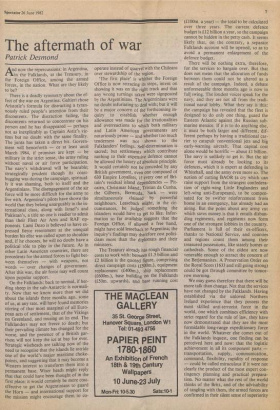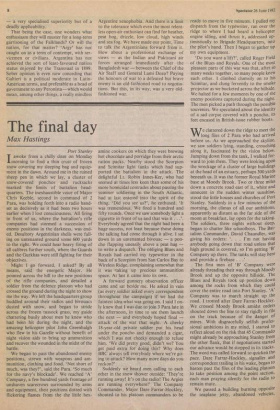The aftermath of war
Patrick Desmond
And now the repercussions: in Argentina, in the Falklands, at the Treasury, in the Foreign Office, among the armed forces, in the nation. What are they likely to be?
There is a deadly symmetry about the ef- fect of the war on Argentina. Galtieri chose Aristotle's formula for distracting a tyran- nously ruled people's attention from their discontents. The distraction failing, the discontents returned to concentrate on his person and he has disappeared — perhaps not as inexplicably as Captain Astiz's vic- tims but no doubt with the same finality. The junta has taken a direct hit. Govern- ment will henceforth — or at least until March 1984, if promises are kept — be military in the strict sense, the army ruling without naval or air force participation. The navy's withdrawal will be bearable; strategically prudent though its coast- hugging was during the campaign, spiritual- ly it was shaming, both to itself and the Argentinians. The disengagement of the air force will be more difficult for the army to live with. Argentina's pilots have shown the world that they belong unarguably in the in- ternational class, along with Israel's and Pakistan's, a title no one is readier to admit than their Fleet Air Arm and RAF op- ponents. Larni Dozo is believed to have ex- pressed fierce resentment at the unequal burden his elite was called upon to shoulder and, if he chooses, he will no doubt have a political role to play in the future. As in other Latin American countries, there are precedents for the armed forces to fight bet- ween themselves — with weapons, not words — over changes of government. After this war, the air force may well count upon popular support.
On the Falklands: back to normal, if her- ding sheep in the sub-Antarctic is normali- ty. Now that we know more than we did about the islands three months ago, some of us, at any rate, will have found memories stirring of that most marginal of all Euro- pean acts of settlement, that of the Vikings on Greenland, and musing on its end. The Falklanders may not freeze to death; but their prevailing climate has changed for the worse, and the presence of a British gar- rison will not keep the ice at bay for ever. Strategic wiseheads are talking now of the need to recognise that the islands lie astride one of the world's major maritime choke- points, and suggesting that it may become a Western interest to transform them into a permanent base. Wiser heads might reply that that could have been thought of in the first place; it would certainly be more cost- effective to get the Argentinians to guard the Horn — and international support for the mission might encourage them to co- operate instead of quarrel with the Chileans over stewardship of the region.
'The first place' is whither the Foreign Office is now retracing its steps, intent on showing it was on the right track and that any wrong turnings taken were signposted by the Argentinians. The Argentinians were no doubt infuriating to deal with; but it will be a major concern of the forthcoming in- quiry to establish whether enough allowance was made for the irrationalities and overreactions to which both military and Latin American governments are notoriously prone — and whether too much tenderness was not shown to the Falklanders' feelings. Self-determination is sacred; but settlements which contribute nothing to their expensive defence cannot be allowed the luxury of absolute principle. It would certainly not be conceded by any British government, even one composed of 630 Empire Loyalists, if every one of Bri- tain's residual island dependencies — Pit- cairn, Christmas Island, Tristan da Cunha, the Gilberts, Bermuda, Sark — were simultaneously claimed by powerful neighbours. Leaseback might, in the cir- cumstances, be judged something the islanders would have to get to like. Infor- mation so far available suggests that the Foreign Office, if allowed a free hand, might have sold leaseback to Argentina; the inquiry's findings may therefore cost politi- cians more than the diplomats and their ministers.
The Treasury already has rough financial- costs to work with: between £1.5 billion and £2 billion is the quoted figure, comprising direct campaign costs (000m.), equipment replacement (£400m,), ship replacement (£600m.), base building on the Falklands (£50m. upwards), and base running cost
(£100m. a year) — the total to be calculated over three years. The current defence budget is £12 billion a year, so the campaign cannot be hidden in the petty cash. It seems likely that, on the contrary, a separate Falklands account will be opened, so as to avoid a permanent enlargement of the defence budget.
There will be nothing extra, therefore, for the services to bargain over. But that does not mean that the allocation of funds between them could not be altered as a result of the campaign. Indeed, a debate unforeseeable three months ago is now in full swing. The loudest voices speak for the navy, and they are not all from the tradi- tional naval lobby. What they say is this: the campaign has revealed that the fleet is designed to do only one thing, guard the Eastern Atlantic against the Russian sub- marine menace. If it is to do anything else, it must be both larger and different, dif- ferent perhaps by having a traditional car- rier to catapult conventional jets and big early-warning aircraft. That capital cost alone would be horrific — about £1 billion. The navy is unlikely to get it. But the air force must already be looking to its defences, which it is expert at defending in Whitehall, and the army even more so. The notion of cutting BAOR (a cry which can raise support from the strangest confedera- tion of right-wing Little Englanders and left-wing anti-Europeans), to be compen- sated for by swifter reinforcement from home in an emergency, has already had an airing. But the point about any army cut which saves money is that it entails disban- ding regiments, and regiments now form one of the strongest lobbies in the country. Parliament is full of their ex-officers, thanks to National Service, and counties and regions count them among their treasured possessions, like stately homes or cathedrals. Some of the oldest are now venerable enough to attract the concern of the Betjemanites. A Preservation Order on the Royal Scots (1633 and still going strong) could be got through committee by tomor- row morning.
We may guess therefore that there will be more talk than change. Not that the services have not changed by the Falklands. Having established via the unloved Northern Ireland experience that they possess the most skilled anti-terrorist force in the world, one which combines efficiency with strict regard for the rule of law, they have now demonstrated that they are the most formidable long-range expeditionary force in the world. Whatever else comes out of the Falklands inquest, one finding can be perceived here and now: that the logistic achievement in all its component parts — transportation, supply, communication, command, flexibility, rapidity of response — could be called miraculous if it were not clearly the product of the most expert con- tingency planning and practical prepara- tion. No matter what the rest of the world thinks of the Brits, and of the advisability of tangling with them, the armed forces are confirmed in their silent sense of superiority — a very specialised superiority but of a deadly applicability.
That being the case, one wonders what enthusiasm they will muster for a long-term garrisoning of the Falklands? Or will the nation, for that matter? 'Argy' has not caught on as a term of contempt, with ser- vicemen or civilians. Argentina has not achieved the sort of least-favoured nation status enjoyed by the Transvaal in 1899. Sober opinion is even now conceding that Galtieri is a political moderate in Latin- American terms, and preferable as a head of government to any Peronista— which would mean, among other things, a really mindless Argentine xenophobia. And there is a limit to the tolerance which even the most relent- less open-air enthusiast can find for heather, peat bog, drizzle, low cloud, high winds and sea fog. We have made our point. Time to talk the Argentinians forward from it. How about a professional exchange of views — as the Indian and Pakistani air forces arranged immediately after the Bangladesh war — between the Chief of the Air Staff and General Lami Dozo? Paying the honours of war to a defeated but brave enemy is an old-fashioned road to negotia- tions. But this, in its way, was a very old- fashioned war.























































 Previous page
Previous page